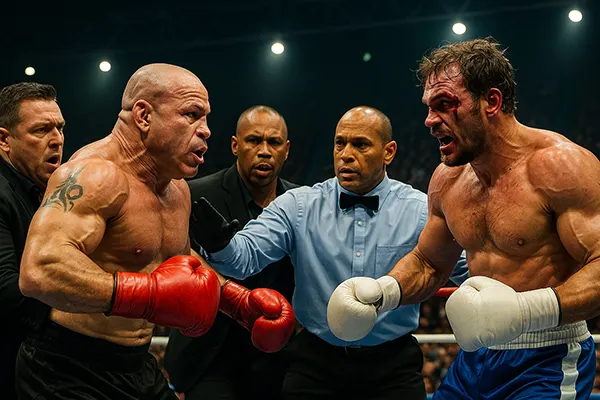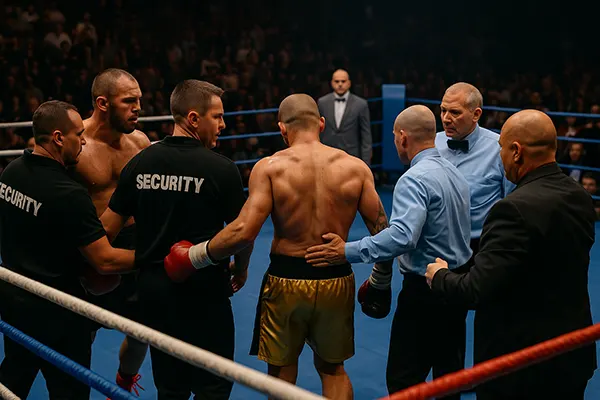
Scandal in the Ring: Wanderlei Silva and the Fury–Freitas Case — Consequences and Sanctions
The boxing world has always been no stranger to controversy, but the recent exhibition bout involving Wanderlei Silva and the Fury–Freitas incident in 2025 has shaken the industry in unexpected ways. A heated altercation escalated beyond sportsmanship, leading to disciplinary action and long-term implications for fighters, organisers, and fans alike. The scandal not only triggered a 180-day suspension but also sparked debate about accountability and the safety of athletes in exhibition events.
The Exhibition Bout That Sparked the Scandal
The event was originally billed as a showcase of skill and entertainment rather than a professional contest. Wanderlei Silva, a veteran of combat sports with a storied history in MMA, joined the line-up alongside boxing figures to bring added spectacle. The presence of Fury and Freitas was expected to provide excitement and international appeal, highlighting the crossover between disciplines.
However, tensions flared when an exchange inside the ring quickly turned into a physical confrontation that violated the exhibition’s rules. Spectators witnessed a brawl that went beyond regulated combat, forcing officials to intervene. The shocking escalation undermined the promotional message of the event and raised immediate concerns about fighter conduct.
Following the incident, organisers faced criticism for inadequate supervision and poor handling of rising tensions. Questions were raised about whether exhibition matches require stricter guidelines to prevent fighters from misusing the format as a stage for unsanctioned aggression.
Immediate Consequences for the Fighters
In response to the outburst, the athletic commission imposed a 180-day suspension on those involved. This decision was justified by the need to reinforce discipline and maintain integrity within combat sports. Both Fury and Freitas were directly sanctioned, while Silva’s involvement brought renewed scrutiny to his long career and his role in encouraging the confrontation.
The penalties mean the fighters are barred from participating in any officially sanctioned boxing or mixed martial arts events during the ban. This not only disrupts their training and competitive calendars but also impacts financial opportunities linked to fights, sponsorships, and media appearances.
For Silva, the incident casts a shadow on his legacy. Once celebrated for his aggressive yet controlled style, his association with the scandal threatens to redefine public perception of his contribution to combat sports.
The Role of Commissions and Sanctioning Bodies
One of the key outcomes of the scandal has been the renewed attention to the role of athletic commissions in ensuring fighter safety and fair play. Commissions worldwide are tasked with monitoring conduct, approving events, and enforcing sanctions when necessary. Their intervention in this case was critical in demonstrating that exhibition matches cannot exist in a regulatory vacuum.
The sanctions underline that even non-title or exhibition fights fall under the purview of official bodies. This consistency is essential for maintaining credibility within the industry and protecting athletes from unnecessary risk. If fighters believe exhibitions offer a loophole, incidents like the Silva and Fury–Freitas clash may become more frequent.
International cooperation is also a factor, as suspensions applied in one jurisdiction often influence fighter eligibility in others. By extending recognition of the penalties across governing bodies, regulators ensure that accountability is not limited to a single region.
Impact on the Future of Exhibition Fights
The case has intensified calls for reform in how exhibition events are organised. Many critics argue that entertainment-focused bouts blur the line between professional sport and showmanship, creating conditions where fighters may not respect traditional codes of conduct. The Silva and Fury–Freitas scandal has reinforced that even entertainment matches must prioritise safety and sportsmanship.
Promoters may now be required to adopt stricter contracts with clauses addressing unsportsmanlike behaviour. These agreements could include financial penalties, longer suspensions, or even permanent bans for those who cross the line. Such measures would aim to deter misconduct and reassure fans that the sport is managed responsibly.
For athletes, the scandal serves as a reminder that reputational damage can outweigh the short-term attention gained from controversy. Protecting one’s professional image is now as important as physical preparation for future bouts.

Broader Implications for Combat Sports
Beyond the immediate sanctions, the Silva and Fury–Freitas affair highlights deeper issues facing modern combat sports. Balancing commercial interests with sporting integrity remains a challenge for promoters, particularly when blending disciplines like boxing and MMA. While crossover fights attract global attention, they also introduce variables that governing bodies must be prepared to address.
The incident has also reignited discussions about athlete welfare. The escalation inside the ring not only endangered the fighters involved but also set a troubling example for younger athletes and audiences. Critics argue that tolerating such behaviour risks normalising violence outside the agreed rules of competition.
Finally, the scandal underscores the growing importance of transparency. Fans demand clear communication from organisers, sanctioning bodies, and fighters regarding the rules, responsibilities, and consequences of misconduct. Addressing these expectations is key to preserving trust in the sport.
Lessons Learned and the Path Forward
Looking ahead, the combat sports industry must adopt a proactive stance. Training camps, coaches, and fighters themselves need to reaffirm the principles of respect and professionalism that underpin the sport. Education on sportsmanship and discipline could be formalised as part of fighter preparation.
Promoters also carry responsibility. When planning crossover or exhibition events, risk assessment should be prioritised, with contingency measures in place for potential disputes. Stronger partnerships with commissions and medical staff can ensure fighters remain safe and rules are upheld.
Ultimately, the Wanderlei Silva and Fury–Freitas scandal serves as a cautionary tale. While combat sports thrive on passion and intensity, they must remain rooted in respect for rules and opponents. Only by reinforcing these values can the industry continue to grow without compromising its credibility.
The most popular articles
-
 Differences between bookmaker bets and casino bets
Differences between bookmaker bets and casino betsFor those new to the world of online gambling, understanding …
-
 Exploring 22Bet: A Comprehensive Review of the Betting Giant
Exploring 22Bet: A Comprehensive Review of the Betting GiantIn the diverse realm of sports betting, 22Bet stands out …
-
 How to Select the Best Odds for Esports Betting
How to Select the Best Odds for Esports BettingEsports betting has grown exponentially in recent years, attracting millions …
-
 Fonbet Bookmaker Review: Is It Worth Trusting?
Fonbet Bookmaker Review: Is It Worth Trusting?Fonbet is a well-established bookmaker that has built a strong …
